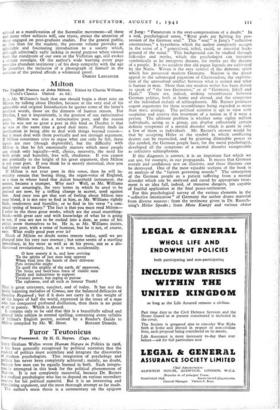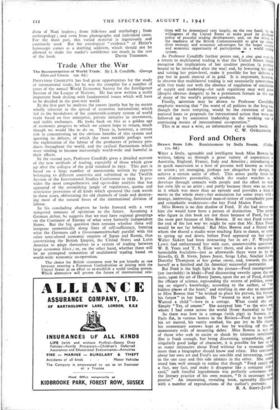Furor Teutonicus
Germany Possessed. By H. G. Baynes. (Cape. x6s.)
SINCE Graham Wallas wrote Human Nature in Politics in 1908, t has been generally recognised by political scientists that the tudent of politics must assimilate and integrate the discoveries .modern psychologists. This integration of psychology and 'litics has never been completely achieved ; mainly, no doubt, use few men can be equally learned in both. Such integra- on is attempted in this book for the political phenomenon of azism. It is not completely successful, because Dr. Baynes a medical psychologist who has to depend on various secondary tines for his political material. But it is an interesting and ulating argument, and the most thorough attempt so far made. The author's main thesis is a commentary on the epigram of Jung: " Fanaticism is the over-compensation of a doubt." In a real, psychological sense, " Rival gods are fighting for pos- session of the German soul." This " soul " is Jung's " collective unconscious," a hypothesis which the author completely accepts in the sense of a " generalised, tribal, racial, or ancestral back- ground of the mind." This background can be studied through folk-tales and myths, which the psychologist can interpret symbolically as he interprets dreams, for myths are the dreams of a people. It is no accident that old pagan legends are cultivated by the Nazis. Wotan is the very symbol of the demonic spirit which has possessed modern Germany. Nazism is the direct appeal to the submerged paganism of Christendom, the exploita- tion of the unresolved conflict between what is animal and what is human in man. More than one modern writer has been driven to speak of " the two Germanys," or of " Germany, Jekyll and Hyde." There are, indeed, striking resemblances between German politics, both at home and abroad, and the symptoms of the individual malady of schizophrenia. Mr. Baynes produces cogent .arguments for these resemblances being regarded as more than mere analogy. The political scientist is apt to view with suspicion and reserve this treatment of a nation as if it were a person. The ultimate problem is whether some eighty million individuals, acting as a group, can display collectively certain definite symptoms of a mental disorder which is acute in only a few of them as individuals. Mr. Baynes's answer would be that by accepting Hitler as the symbol in which conflicting desires can be reconciled, and by granting illimitable power to this symbol, the German people have, for the social psychologist, developed all the symptoms of a mental disorder recognisable as collective schizophrenia.
If this diagnosis is correct, it is an important fact which we can use, for example, in our propaganda. It means that German morale and confidence rest on illusions, and these illusions can be destroyed. One of the most valuable sections of the book is an analysis of the "factors governing morale." The conception of the German people as a patient suffering from a mental disorder which can be analysed and cured by appropriate treat- ment is an idea full, indeed, of immense dangers, yet capable of fruitful application at the final peace-settlement. For this psychological survey of the various elements in the " collective intoxication " of Germany the author draws material from diverse sources : from the testimony given in Dr. Rausch- ning's Hitler Speaks ; from Mein Kampf and various ()biter
dicta of Nazi leaders ; from folk-lore and mythology ; from anthropology ; and even from photographs and individual cases. For the most part, this varied material is ingeniously and cautiously used. But the astrological " evidence " of Hitler's horoscope comes as a startling addition, which should not be allowed to shake the reader's confidence too much in the rest



























 Previous page
Previous page